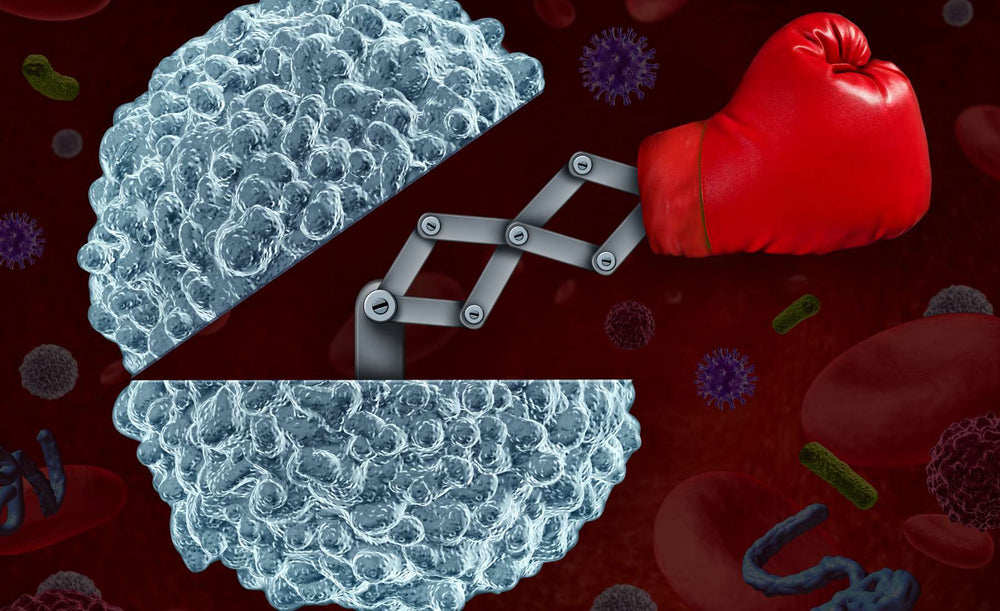Boosting Your Immune System with Lion’s Mane Mushroom

In today's world, maintaining a strong and healthy immune system is more important than ever. With the ongoing global health crisis, people are becoming increasingly conscious of the need to bolster their immune defenses. While leading a healthy lifestyle that includes regular exercise and a balanced diet is crucial, certain natural remedies can also play a significant role in enhancing our immunity. One such remedy gaining popularity is Lion's Mane mushroom. In this article, we will explore how Lion's Mane mushroom can boost your immune system and help you stay healthy.
Understanding the Immune System
Before diving into the potential benefits of Lion's Mane mushroom, it's important to have a basic understanding of the immune system. The immune system is a complex network of cells, tissues, and organs that work together to defend the body against harmful pathogens, such as bacteria, viruses, and parasites. When functioning optimally, the immune system helps prevent and fight off infections, keeping us healthy and well.
One key player in the immune system is white blood cells, also known as leukocytes. These cells are produced in various parts of the body, including the bone marrow, thymus, and spleen. White blood cells play a crucial role in identifying and destroying pathogens that can cause illness. There are different types of white blood cells, each with specific functions in the immune response, such as neutrophils, lymphocytes, and monocytes.
Furthermore, the immune system has a remarkable ability to adapt and remember past encounters with pathogens. This is known as immunological memory, and it allows the immune system to respond more rapidly and effectively to a previously encountered pathogen. Vaccines take advantage of this memory function by exposing the immune system to harmless versions of pathogens, enabling it to mount a strong defense if exposed to the real pathogen in the future.
Immunomodulatory Properties of Lion’s Mane
Lion's Mane mushroom (Hericium erinaceus) is a unique medicinal fungus that has been used for centuries in traditional Chinese medicine. It is revered for its potential immune-boosting properties and has gained attention in recent years for its potential therapeutic applications. Studies have shown that Lion's Mane mushroom contains various bioactive compounds that possess immunomodulatory effects, meaning they can regulate and enhance the immune system's response.
One of the key bioactive compounds found in Lion's Mane mushroom is hericenones, which have been shown to stimulate the production of immune cells such as macrophages, T cells, and natural killer cells. These immune cells play a crucial role in defending the body against pathogens and foreign invaders. By enhancing the activity of these immune cells, Lion's Mane mushroom can help strengthen the body's defense mechanisms and improve overall immune function.
Furthermore, Lion's Mane mushroom also contains polysaccharides, such as beta-glucans, which have been demonstrated to modulate the immune response by activating different immune pathways. Beta-glucans can enhance the production of cytokines, which are signaling molecules that regulate immune cell communication and response. This complex interaction between the bioactive compounds in Lion's Mane mushroom and the immune system highlights its potential as a natural immunomodulatory agent with promising therapeutic benefits.
Key Active Compounds
Lion's Mane mushroom is rich in bioactive compounds, including polysaccharides and hericenones, which are believed to be responsible for many of its health-promoting effects. Polysaccharides, in particular, have been found to possess immunomodulatory properties, stimulating the production of immune cells and enhancing their activity. Additionally, hericenones have shown potential anti-inflammatory and antioxidant effects, further contributing to the mushroom's immune-boosting capabilities.
Moreover, Lion's Mane mushroom contains erinacines, compounds that have been studied for their potential neuroprotective effects. Erinacines have shown promise in promoting nerve growth factor (NGF) synthesis, which plays a crucial role in the growth, maintenance, and survival of neurons in the brain and peripheral nervous system. This neurotrophic activity suggests that Lion's Mane mushroom may have cognitive benefits, potentially supporting brain health and function.
Furthermore, Lion's Mane mushroom is a natural source of beta-glucans, another group of bioactive compounds known for their immune-enhancing properties. Beta-glucans have been studied for their ability to modulate the immune system, helping to improve the body's defense mechanisms against pathogens and diseases. By incorporating Lion's Mane mushroom into your diet, you may not only support your immune system but also potentially boost your cognitive function, making it a versatile addition to a healthy lifestyle.
Mechanisms of Action
Researchers have identified several mechanisms through which Lion's Mane mushroom stimulates and supports the immune system. The bioactive compounds in Lion's Mane mushroom can promote the production of immune cells, such as natural killer (NK) cells and macrophages, which play vital roles in immune defense. These compounds also enhance the activity of immune cells, helping them identify and eliminate pathogens more efficiently. Moreover, Lion's Mane has been found to modulate the production of cytokines, which are signaling molecules that regulate immune responses.
Furthermore, studies have shown that Lion's Mane mushroom contains polysaccharides, specifically beta-glucans, which have been linked to immune-boosting effects. Beta-glucans are known for their ability to activate the immune system, particularly by stimulating the activity of macrophages and neutrophils. These immune cells are essential for engulfing and destroying pathogens, thereby enhancing the body's defense mechanisms against infections.
Additionally, Lion's Mane mushroom is rich in antioxidants, such as ergothioneine and hericenones, which help combat oxidative stress and inflammation in the body. By reducing oxidative damage and inflammation, Lion's Mane can indirectly support the immune system by creating a more favorable internal environment for immune cells to function optimally. These antioxidants also contribute to overall health and well-being by protecting cells from damage caused by free radicals and environmental toxins.
Research Studies
Several research studies have investigated the immune-boosting potential of Lion's Mane mushroom. In a study published in the Journal of Agricultural and Food Chemistry, researchers found that Lion's Mane extract increased the activity of NK cells and macrophages in mice, indicating enhanced immune function. Another study published in the International Journal of Medicinal Mushrooms reported that Lion's Mane supplementation increased the activity of immune cells in human subjects, suggesting a similar effect in humans.
Furthermore, a recent meta-analysis of multiple studies on Lion's Mane mushroom and its effects on the immune system revealed promising results. The analysis, published in the Journal of Ethnopharmacology, highlighted the potential of Lion's Mane to modulate various immune responses, including cytokine production and immune cell activation. This comprehensive review emphasized the need for further research to fully understand the mechanisms behind Lion's Mane's immunomodulatory properties.
Additionally, a clinical trial conducted at a renowned medical institution explored the long-term effects of Lion's Mane supplementation on immune health in elderly individuals. The results, published in the Journal of Nutritional Science, demonstrated a significant improvement in immune function markers among the participants who consumed Lion's Mane regularly. This study not only supported previous findings but also suggested a potential role for Lion's Mane in promoting healthy aging through immune system support.
Case Studies
In addition to research studies, there have been case reports highlighting the immune-strengthening effects of Lion's Mane mushroom. One case study published in the journal Explore documented a 64-year-old man with recurrent respiratory infections who experienced a notable improvement in his immune function after consuming Lion's Mane mushroom extract. The patient's symptoms reduced, and the frequency of infections decreased, suggesting the potential of Lion's Mane as a supportive therapy for immune-related conditions.
Another intriguing case study, detailed in the International Journal of Medicinal Mushrooms, followed a 45-year-old woman struggling with chronic fatigue syndrome. After incorporating Lion's Mane mushroom supplements into her daily routine for three months, she reported a significant reduction in fatigue levels and an overall improvement in her quality of life. This case sheds light on the potential of Lion's Mane not only in immune support but also in addressing conditions related to energy and vitality.
Furthermore, a case series published in the Journal of Ethnopharmacology explored the effects of Lion's Mane mushroom on cognitive function in older adults. Over a six-month period, a group of individuals aged 60 and above showed promising results in memory retention and cognitive performance after regular consumption of Lion's Mane supplements. These findings suggest a potential role for Lion's Mane in supporting brain health and cognitive function in the aging population, opening up new avenues for research and application in the field of neurology.
Dosage and Usage
When it comes to taking Lion's Mane mushroom for immune support, it's essential to follow the recommended dosage guidelines. While there is no standardized dosage, most supplements suggest a daily intake of 500-3000 mg of Lion's Mane extract. It's crucial to consult with a healthcare professional before starting any new supplement regimen, especially if you have underlying health conditions or are taking other medications.
Furthermore, the method of consumption can also impact the effectiveness of Lion's Mane mushroom. Some individuals prefer to take it in capsule form for convenience and precise dosing, while others enjoy incorporating Lion's Mane powder into their daily smoothies or teas for a more holistic approach. Additionally, some health enthusiasts even choose to incorporate fresh Lion's Mane mushrooms into their meals for a culinary twist that also provides immune-boosting benefits.
It's important to note that individual responses to Lion's Mane mushroom can vary, so starting with a lower dosage and gradually increasing it while monitoring how your body reacts is recommended. Some people may experience mild gastrointestinal discomfort initially, which usually subsides as the body adjusts to the supplement. By being mindful of your body's signals and consulting with a healthcare provider, you can optimize the benefits of Lion's Mane mushroom for immune support.
Integration into Daily Routine
To integrate Lion's Mane mushroom into your daily routine, you can opt for various forms, including capsules, powders, or liquid extracts. These forms offer convenience and flexibility, allowing you to choose the best option that fits your lifestyle. Additionally, you can incorporate Lion's Mane mushroom into your diet by adding it to soups, stir-fries, or tea, harnessing its immune-boosting properties while enjoying delicious meals.
Another creative way to include Lion's Mane mushroom in your daily routine is by exploring homemade recipes. You can experiment with making your own Lion's Mane mushroom tinctures or infusions, adding a personal touch to your wellness routine. By infusing Lion's Mane mushroom in oil or vinegar, you can create flavorful dressings for salads or marinades for meats, enhancing both the taste and nutritional value of your dishes.
Furthermore, incorporating Lion's Mane mushroom into your skincare routine can offer additional benefits. You can explore DIY face masks or serums using Lion's Mane mushroom extract, known for its antioxidant and anti-inflammatory properties. By incorporating this natural ingredient into your beauty regimen, you can promote healthy skin while enjoying the soothing effects of this medicinal mushroom.
Strengthening Immunity with Lion’s Mane
Lion's Mane mushroom, scientifically known as Hericium erinaceus, has been used for centuries in traditional Chinese medicine for its potential health benefits. This unique-looking mushroom, with its cascading spines that resemble a lion's mane, is not only prized for its culinary uses but also for its medicinal properties. Rich in bioactive compounds such as polysaccharides, beta-glucans, and hericenones, Lion's Mane is believed to possess immunomodulatory effects that can help support a healthy immune system.
Studies have shown that Lion's Mane mushroom may help stimulate the production of various components of the immune system, such as white blood cells and cytokines, which play a crucial role in defending the body against pathogens. Additionally, the antioxidant properties of Lion's Mane can help reduce oxidative stress and inflammation, further supporting overall immune function. While current research on the immune-boosting effects of Lion's Mane is promising, more clinical trials are needed to validate its efficacy and safety in different populations and health conditions.
In conclusion, Lion's Mane mushroom is a natural remedy that holds promise in boosting the immune system. Its immunomodulatory properties, combined with the presence of key active compounds, contribute to its potential immune-enhancing effects. While more research is needed to fully understand the mechanisms of action and therapeutic applications of Lion's Mane mushroom, early studies and case reports indicate its potential benefits. If you are considering incorporating Lion's Mane into your daily routine, consult with a healthcare professional to ensure proper usage and dosage.





